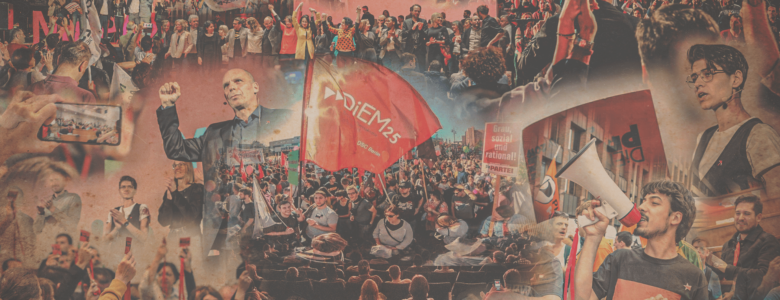
Manifesto launch: It’s a new dawn, it’s a new DiEM25
Our movement has charted a new course that is more radical, confrontational and effective
When DiEM25 was founded in February 2016, it brought together progressives united in recognising one simple fact: Europe had to be democratised, or it would disintegrate.
Since then, it has disintegrated. Brexit happened. Divides emerged and deepened – between north and south, east and west. Our border forces are complicit in the deaths of people crossing the Mediterranean, the planet continues to warm, and fascism continues to rise. War has broken out. All throughout, Europe has teetered between an incapability to respond, while actively provoking these disasters.
Why did it happen, and how can we take back power?
These are the questions our movement set out to answer when writing our new guiding document. Hence, after much discussion and an all-member vote, DiEMers have an answer: Europe will be democratised, once the oligarchy is overthrown!
They own the apartments we live in, the banks that keep our money, the vaccines that save our lives, the apps we need to work, the data these apps collect about us, the oil and gas that heat up our planet – and, more importantly, they own the politicians that were supposed to defend us against them.
To democratise Europe, we have to take back power from the oligarchs. And for that, we need a new, reinvigorated DiEM25 – more radical, more confrontational, and more effective than ever.
The day is ours. Let’s seize it, together.

Jeremy Corbyn discusses Ukraine, Greece, Brexit, NHS and Labour Party ahead of participation at MeRA25 Congress
On his way to Athens to take part in the first Congress of MeRA25, our political party in the Greek parliament, former UK Labour leader Jeremy Corbyn spoke to Greek daily newspaper TA NEA. Read his interview below.
Mr Corbyn, you are coming to Greece this May to participate in the MeRA25 Congress. Why MeRA25? The Syriza Congress took place recently, and as far as I know, they too wanted to invite you.
I’ve been planning a trip to Greece with Yanis Varoufakis for some time and I’m delighted to attend the MeRA25 Congress to discuss peace, justice and international solidarity.
I’m not aware of any other invitation but, of course, I work with left and progressive parties across Europe and indeed the world. That includes Syriza, who I sit and work with in the Unified European Left Group at Parliamentary Assembly of the Council of Europe.
A general question: In the latest French election, we witnessed the consolidation of a strong far right presence with Le Pen and Zemmour, even though Macron was reelected. On the other hand, Spain and Portugal have social democratic governments. Which trend do you believe will prevail?
I believe that because things are the way they are, they can’t stay the way they are. The global system is breaking down: climate, debt, supply chains, conflict, inequality. The centre cannot hold and, as you suggest, we are already witnessing the growth of the far right in many countries. It is up to the left to present a powerful and hopeful alternative. I know we can do it.
Mélenchon got close to beating the far right in the presidential elections and I’m hopeful that now the left is coming together in France that hope is on the horizon.
Where do you stand on the Russian invasion in Ukraine? Do you believe that it is right politically to confront both Russia and Nato?
I utterly condemn Russia’s invasion of Ukraine. It is unjustifiable. The focus now must be on securing a ceasefire, the withdrawal of Russian troops and a comprehensive negotiated settlement.
That comprehensive negotiated settlement must clearly include neutral status for Ukraine. NATO should have wound up at the end of the Cold War. Military alliances and belligerence breeds further belligerence. NATO expansion is wrong and sets back the cause of peace. So those of us that live in NATO countries must be critical of the role our governments have played in stoking tensions and creating the conditions in which Putin has taken his murderous and foolish decision to invade Ukraine.
How does your Peace and Justice Project address war and peace issues more broadly?
Our position is very simple: wars end with dialogue and negotiation so let’s find ways to fast forward to that and cut out the fighting. In the short term, we achieve that through building a mass, global peace movement that can pressure governments to come to the table and talk. In the longer term, we challenge the war machine: the arms companies, the defence contractors and the trigger happy political class: through campaigns in our own countries and internationally through the UN and other bodies to get to a nuclear free world. And we also build the institutions that can manage and resolve conflict and truly advance a diplomacy of peoples.
Regarding the UK, did your nuanced Brexit position cost you politically? How do you see Brexit evolving today?
Brexit divided our potential electoral coalition and sucked the energy away from other vital issues. We wanted to bring together the many – leave and remain voters – against the few.
Brexit means two rather different things. One is a political or cultural signifier in British politics and society. I think that one will drift away and be replaced by others. Brexit as a political project has been achieved.
The other meaning is as a practical project for changing Britain’s relationship with the EU. This will have many more twists in the tail and depends on developments in the EU too. I think on some areas, we’ll see greater cooperation between the EU and the UK. But whether the UK will be able to pursue a different economic model with some distance from EU rules, that depends on the political direction of EU states and the UK. Will we move away from the neoliberal model, which will mean either breaking or changing EU rules, as Mélenchon is talking about in France, or will we remain chained to it? It’s a question for the UK and the EU alike and would be regardless of the formal relationship.
As Greece is coming out of the pandemic, do you believe it is the right time to discuss our National Health System? Do you believe the idea of a public NHS is gathering strength or will the establishment find ways of continuing to undermine it?
The NHS is the single most civilised thing about the UK. It’s a great victory won by the British people. We will always defend it. Right now it is being terribly run down, underfunded and privatised. We not only need to turn that around but create a National Care Service to ensure everyone can live in dignity and without fear of getting old or sick.
One last thing: You were expelled from the Labour Party for alleged antisemitism. How do you respond to these accusations and to the new leadership’s behaviour towards you? More generally, could you comment on Keir Starmer’s policies?
I am obviously very saddened that the party that I’ve dedicated my entire political career to has arrived at this position. It’s no secret that as Labour leader I took my fair share of abuse, not least from some grossly unfair and extremely hostile media which has been the subject of a number of academic studies. But nothing was and is quite as hurtful as the suggestion that I, or any of my team, were in any way complicit in antisemitism.
For 35 years as MP for Islington North, I have stood shoulder to shoulder and worked hand in hand with both my Jewish constituents and Jewish communities across the country to confront antisemitism and to advance Jewish causes. I have warned against and constantly sought to draw attention to the rise in antisemitism across Europe, and the need for politicians across parties to confront it. My record on this speaks for itself for anyone who cares to look. So this allegation was not just deeply hurtful on a personal level, it was categorically untrue. In fact I am extremely proud of our record in introducing root and branch reforms to the Labour Party’s governance that went further than any leadership in history to expose and confront anti-Jewish prejudice within the Labour movement.
Again, the evidence and record is absolutely conclusive on this. By the time we managed to gain control over Labour’s governance from politically hostile incumbents, the rate of antisemitism complaints investigations increased fourfold and there was a dramatic escalation in the number of sanctions – including expulsions – for those engaging in any kind of prejudice against Jewish members or Jewish people in general.
It remains a profound injustice to Jewish members that the factionalism and hostility of senior incumbent officials within the Labour party impeded some of our initial efforts to introduce reforms. And it is a profound failure of the EHRC investigation into this matter that they did not shine a light on this, and uncover the real root causes of initial failings in the complaints system. But as Labour leader I accepted my ultimate responsibility for every single case of antisemitism within our party and I took this extremely seriously, both in terms of concrete actions and apologising wholeheartedly to the Jewish community on behalf of the Labour movement.
That is why I welcomed and endorsed the recommendations of the EHRC report. But I’m afraid the suggestion that the Labour Party under my leadership was institutionally antisemitic, or that me and my team were anything other than relentlessly proactive and determined to address this issue is a constructed lie, and one that gained enormous traction across the mainstream press. That is the point that I was making in my statement following the EHRC report which triggered my suspension from the party.

The day is ours: Read our first ever manifesto update on May 9, Europe Day
This is our time.
On this year’s Europe Day, DiEM25 starts anew. Read our first-ever updated manifesto on May 9, 2022 with a new, radical vision for a democratic Europe. And join us for a special DiEM TV livestream on that same day at 18:00 CEST.
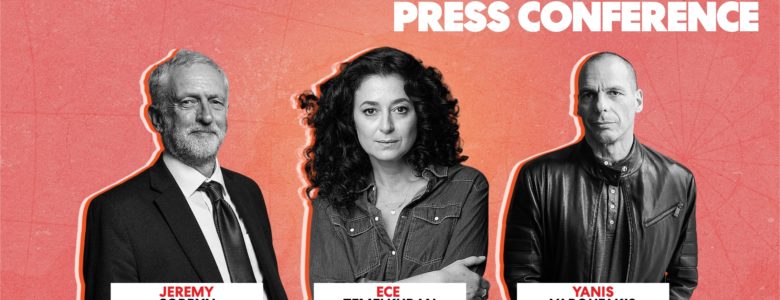
Watch live: the Athens Declaration, presented by Yanis Varoufakis, Jeremy Corbyn and Ece Temelkuran
Today, May 13, 2022 at 11:00 CEST, in the context of MeRA25’s 1st Deliberative Congress (May 12-15 May) Jeremy Corbyn, Ece Temelkuran and Yanis Varoufakis will hold a joint press conference, on behalf of the Progressive International, DiEM25 and MeRA25, to present:
THE MAY 13, 2022 ATHENS DECLARATION
“The war on Ukraine calls for support for victims of war and a new non-aligned movement”
Within the same context, Jeremy, Ece and Yanis will field questions from the media on the broader geopolitical tensions, the cost-of-living crisis that threatens the most vulnerable, global poverty and inequality, the West’s two-tier refugee policy, and the rise of nationalist authoritarianism.
On the same evening, Ece and Jeremy will address an open session of the delegates of MeRA25 1st Deliberative Congress.
Both, the morning press conference and the evening speeches by Ece Temelkuran and Jeremy Corbyn are open to journalists and members of the public. Everyone is welcome.
Morning Press Conference
Date and time: Friday, May 13, 2022 at 11.00 CEST
Place: Journalists’ Union of Athens Daily Newspapers (Ε.Σ.Η.Ε.Α.), Akadimias 20, Athens 106 71
Evening Speeches by Ece Temelkuran & Jeremy Corbyn
Date and time: Friday, May 13, 2022 at 20:00 CEST
Place: Hellenic Cosmos Cultural Center, Pireos 254, Tavros 177 78
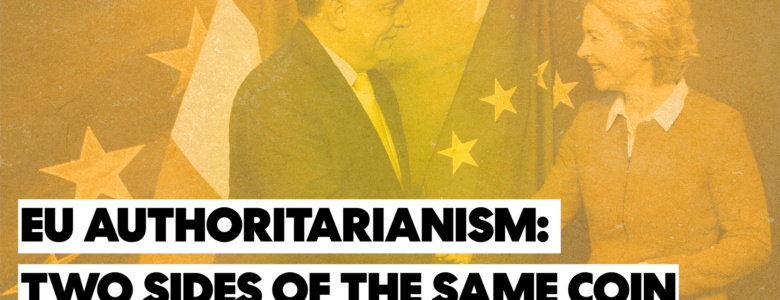
EU authoritarianism: Two sides of the same coin
DiEM25’s Coordinating Collective’s view on Hungary
After 12 years of Viktor Orbán’s autocracy and the tremendous damage he has done to Hungary, its minorities and immigrants, the European Union is threatening to expel the country from the alliance. We can agree that certain parameters need to be met in order to keep countries from sliding into fascism. But talking about expelling a country from the EU at this very moment is just a cherry on top of the EU’s hypocrisy pie.
Orbán has been trying to build this far-right alliance for a long time, which would have the potential to be extremely dangerous. On the other hand, let’s make no mistake – there have always been two kinds of authoritarianism: the far-right’s and the neoliberal Establishment’s. The former is being bravely led by Orban, Marine Le Pen, Recep Tayyip Erdoğan and others, while the latter is led by Emmanuel Macron, Ursula von der Leyen and many key figures of so-called “European democracy”.
Why does the European Council want to punish one while whole-heartedly cheering on the other? These two sides of the same coin are so deeply intertwined as to be completely dependent on each other. Fascists need neoliberals to feed them disillusioned voters looking elsewhere to satisfy their needs and rage at the system, while neoliberals need to scare people into voting them in order for fascists not to be elected.
Human rights violations are indeed widespread in some of the member states. And Poland and Hungary probably do deserve to suffer some form of consequence for their government’s actions. But then what of the Catalan referendum, when Spanish police brutally abused and prevented citizens from fulfilling voting duty? This was done under direct orders of the Spanish government. Isn’t that deserving of condemnation?
Expulsion regulations would be deeply problematic if they are to be controlled by current EU structures. What we mentioned above is merely a snapshot of the elitism that exists in Europe, where some nations are “more equal than others” inside of the Union. But let us also take Ukraine, Montenegro, Serbia and others as examples: to join the EU they need to fulfill a tremendous amount of criteria that aren’t met by the vast majority of current EU countries in the first place. And even meeting all of them doesn’t guarantee admission. For those reasons, we cannot be convinced that this is not yet just another case of systemic nationalism inside of Europe.
The European Council needs to be run by the people and for the people. Not by oligarchs and for them. This way, we would ensure that true democracy is in place and that regulations of possible ejection are fair. That’s only possible in a Europe that works towards cooperation, not competition. One that would be based on mutual aid, rather than exploitation of periphery countries by their larger neighbors. An EU where we would collectively care about the wellbeing of the citizens of countries that were threatened with expulsion.
People are not directly responsible for their government’s actions, and it’s up to them to democratically remove autocrats, guaranteeing their countries’ long-term membership in the EU. In the Union which we envision, it would be worth staying.
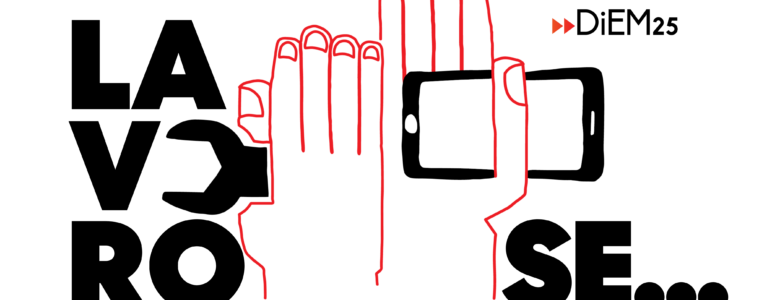
DiEMers in Italy stage flashmob to launch Lavoro Se, a movement to retake our labour rights
On Thursday April 28, DiEMers in Italy staged a flashmob to launch Lavoro Se, a movement to retake control of our labour rights.
Live in Italy? Visit lavoro-se.it/ and join us in taking a few, simple online actions to protect labour rights in Italy.
The flashmob, organised together with performers from the Constitutional Circus, took place at Piazza della Rotonda in Rome.

When and how will the Ukraine war end?
It is the question that is now troubling the entire planet. From the calm, united and controlled way in which the West reacts, it seems that NATO’s plan is moving full steam ahead. Two perspectives open up: with or without Vladimir Putin.
After the annexation of Crimea in 2014, NATO took the Russian threat seriously. As NATO’s Under-Secretary-General recently admitted, the alliance had been preparing Ukraine’s response long before the February 2022 invasion. In fact, Russia‘s military action is not going to plan in all aspects, due to poor training, logistical struggles and especially the poor gathering of information.
It can be said that the invasion of Ukraine was much better prepared by NATO than by Russia. The inability to anticipate the Ukrainian reaction and the lack of preparation of retaliation has brought Moscow into a humiliating and embarrassing situation, without a reasonable possibility of exit.
In this context, the meticulous preparation for retaliation and the secretive undermining of Putin’s political plans raise a big question mark over the cynicism with which NATO acted, given that a violent military reaction by Putin with his back to the wall was predictable.
Many political and especially military analysts, familiar with the Russian war machine, converge on the idea that Putin will not stop until he achieves his goals.
These include an extremely brutal military intervention, crimes against civilians and unprecedented material destruction.
The chasm created between the two nations, considered brothers, will not be able to close for tens or maybe even hundreds of years from now.
Obviously, the other states targeted by Russia in line with its Eurasian Economic Union have now taken note of the methods through which Moscow aims to implement these projects and will desperately seek the protection of the West. The resulting effect is thus the complete opposite of what Putin had planned.
Once these projects have been buried, the question that arises is over what Putin’s victory will consist of. It seems clear that he will not be able to return to his Russian people claiming victory over Nazism. There is a need for tangible results, much more concrete, to justify the huge losses of people and materials, but also the years of deprivation that will follow. His minimal project now seems to be “Novorossiya”.
For a conquest and annexation of southern and eastern Ukraine, however, a reset of military action and a much superior mobilisation of forces are needed. Following the Mariupol model, it is likely that the entire area will be reduced to rubble and then occupied by a much larger military force. To move to the next level of mobilisation and military action, however, a justification is needed for the Russian people, and the concerns of NATO officials are that this will come from simulating or provoking an unconventional weapons attack on Russia.
Ukraine’s neutrality, which was shaped by the renunciation of its inherited nuclear arsenal after the dissolution of the USSR, was constantly attacked from both directions. Of course, this would have been the ideal solution both for the Ukrainian state (in its ethnic context) and for a Europe eager for stability.
But that opportunity has been lost and today’s reality doesn’t seem to lead in this direction: Putin cannot stop the territorial expansion launched in Ukraine and the West, somewhat ironically, cannot accept this new order by which the powerful could gain parts of territories of smaller countries just because they have the power to do it.
As for the likelihood that Putin will accept a negotiation that will end the conflict by renouncing territorial claims or freezing the conflict, the Russian internal context created by the strategic decisions of recent years must be taken into account.
When we hear election slogans from Western politicians like ’Make America Great Again’ both the media and citizens take little interest. But when we are faced with a statement like ‘We will make Russia a great world power’ from someone with Putin’s reputation, it must be understood that we are facing a very serious commitment, based on an official economic and military strategy, which set in motion an entire country and a nation willing to assume its historical role.
An escalation of the conflict in other parts of Europe or the world is unlikely. Russia blocked 70-80 percent of its active military force in Ukraine and consumed about half of the missiles it had at the beginning of the war. This is while NATO has not fired a single bullet from its own arsenal. Of course, challenges may arise to justify new internal mobilisations in Russia, but that’s all about it.
As for the risk of a nuclear attack, it also seems remote. After the initial nervous breakdown, in the face of the harsh reality on the ground, the Russians will likely retreat due to the situation in which they find themselves.
A deeper solution to the military and economic crisis cannot be achieved while Putin is in power in Russia. The abandonment of aberrant expansionist projects can only be done by replacing the Russian leadership. The West’s unequivocal position on Putin leaves no room for conciliation. That is why the number of victims and the volume of destruction in Ukraine, as well as the suffering and deprivation that will affect the entire planet, depend on the speed with which Putin will be replaced by Russia’s leadership.
We, as Democrats, have the opportunity to look beyond the power games and geopolitical interests and to bring to the fore the freedom of choice, the will of the citizens. If, in its current historical and political context, the Ukrainian people have decided to defend their freedom to choose their destiny, and for the moment the destiny they want to build, at the cost of the ultimate sacrifice, is to join to the West and NATO, we have nothing to do but take note of this and eventually support it.
Our goals for democratisation, demilitarisation and peace must be accompanied by a pragmatic approach to the current international situation. The need for security in the world will disappear when the last dictator and the last undemocratic military superpower will disappear.
The rush for military protection and security guarantees will be on the list of priorities in the coming period, especially for small countries and especially for those in the vicinity of powers with expansionist claims. Accepting this reality should not impede democratic processes and the unification of citizens around the world under the same flag, that of freedom and co-operation between people, no matter what political and military area of the world they come from.
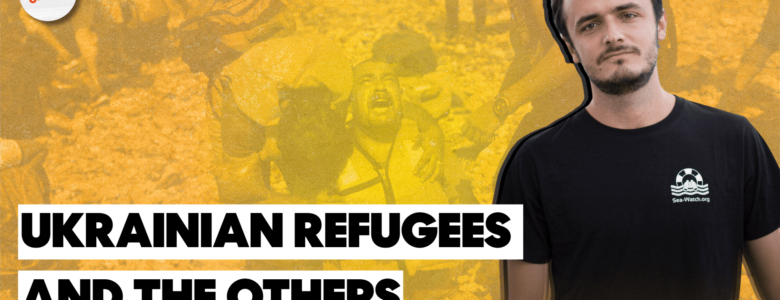
Ukrainian refugees and the others
While the rush to facilitate Ukrainian refugees is admirable, it begs the question as to why the same is not done for everyone else in need
In the last few days, Portugal has received more than 27,000 refugees from Ukraine. How can it be justified that in two years we have not welcomed the 500 children and young people from the Mediterranean that we committed to receive and who have been in refugee camps in the most degrading conditions?
The Russian invasion of Ukraine has generated more refugees in the first three weeks than any other recent conflict for a year. Already, more than four million people have fled the country and it is estimated that there are close to ten million internally displaced persons.
In the face of this huge humanitarian crisis, Europe has shown unprecedented solidarity. In the very first days, extraordinary measures were put in place to guarantee those fleeing the war their rights and an easier and faster access to international protection. Countries that less than a decade ago rose up against the European Union (EU) quota system and from which one could expect anything but solidarity with refugees have now opened their doors to receive the families fleeing the Russian bombs.
More than two million people have already arrived in Poland, making it the country that has taken in the most Ukrainian refugees. In the United Kingdom, the Homes for Ukraine platform has been created, where British citizens can volunteer to provide accommodation to Ukrainian families for a minimum of six months. These families will have immediate access to health, education and social security.
Special measures have also been created in Portugal for the rapid reception of Ukrainian citizens. The Foreigners and Borders Service (SEF) has created the online platform SEFforUkraine where people can request temporary protection from the Portuguese State, a status similar to that of refugee, but for a period of one year and renewable for another year. According to the SEF, it is now possible for a person to ask for protection and get it on the same day, without even going through an interview where, in the usual process, the merits of the request would be decided.
I am moved by the speed of mobilisation that we have shown, that we are capable of helping those who need it most. And it is precisely for this reason that I believe that as a society we urgently need to reflect together on how we have treated non-Ukrainian refugees.
When the news showed us Syrian, Iraqi and Afghan families launching themselves into rubber boats in a desperate attempt to find safety on European shores, countless voices were raised against the reception. There was a great effort of solidarity on the part of civil society and some states, of course. But this position was seen in the media as one side of the public debate, just as valid as the opposite. We heard all sorts of arguments questioning what welcoming refugees would do to our cherished European society.
In today’s conflict the consensus is so great that even extreme right-wing parties, who normally proudly fly the anti-refugee flag, are trying to covertly justify their sudden change of position by going so far as to claim that these are ‘real’ refugees.
This time we don’t hear anyone questioning the sustainability of the welfare state. We don’t see anyone saying that crime will increase. And nobody is invoking the threat of terrorism. Why? Not because there is anything fundamentally different between some refugees and others. All are fleeing violence and all are seeking safety and a dignified life for themselves and theirs. It is because these objections are nothing but myths. They are myths now and they were myths before, when the world was shocked with hands in pockets to see the body of little Alan Kurdi dragged to the Turkish beach by the waves of the sea and European indifference.
However, it should be said that when we talk about the mobilisation of civil society alone, the differences are not that great. At the time when Syrian refugees were arriving by the thousands a day to the coast of the Greek islands, more than 350 Portuguese non-governmental organizations coordinated efforts to welcome the families that would land in our country under the EU Relocation Program. A Refugee Support Platform was created. With open arms these organisations waited for people to arrive while they, in turn, waited patiently for the Program to deliver what it promised. The Relocation Program failed spectacularly, and not only because some countries refused to receive anyone. The lack of means to speed up the processes, as well as the very strict eligibility criteria meant that the number of refugees received was nothing more than a flash in the pan. In fact, this plan was unveiled by the EU in September 2015 and six months later only 660 refugees had been relocated throughout Europe, while the EU was proposing to relocate 160,000. Although civil society in our country was willing and ready to welcome, it was the bureaucratic processes and decisions of European and EU governments that prevented (and continue to prevent) this from happening.
The wars in Syria, Iraq, and Afghanistan have forced several million people to leave their homes and their lives over the past few years, many of whom were not treated with dignity in the countries of transit and arrival. Right now there are thousands of refugees held in camps in Greece who are waiting months on end for a response to their asylum claims, staying overnight in tents, not knowing whether they will be granted protection or be deported. Meanwhile, non-governmental organizations have been warning of widespread starvation in these populations in Greece, 40 percent of whom are minors.
Note that the reluctance to welcome refugees has nothing to do with a lack of resources. Over the past six years, the EU in general and member states in particular have thrown billions of euros at countries like Turkey and criminal militias, as in the case of Libya, to keep people away from their borders, without even the possibility enshrined in international law to apply for asylum. I explore this issue in detail in another text I wrote in PÚBLICO.
In Portugal, the Ministry of Foreign Affairs made some bilateral agreements with several countries whereby it committed itself to receiving refugees. It did the right thing. But it is incomprehensible how long these requests take to become effective and how few people we propose to receive. Facing the humanitarian tragedy in the Greek islands, the former Minister of Foreign Affairs Augusto Santos Silva committed to receive 500 unaccompanied minors in May 2020, at the beginning of the pandemic. Almost two years later, in December last year, we still hadn’t received even half of them.
In the last few days, Portugal has received more than 27,000 refugees from Ukraine, making this the second largest foreign nationality residing in our country. How can it be justified that after two years we still haven’t managed to receive 500 children and young people that we committed to receive and who have to spend this time in refugee camps in the most undignified conditions? Furthermore, according to the Diário de Notícias, in August of last year the SEF had requests for regularisation of immigrants pending with a four-year delay. How can we justify the months or years that immigrants in Portugal spend waiting for SEF to evaluate their cases after this institution put in place such an efficient system for Ukrainian refugees? Why can’t we apply a fraction of that efficiency to all those who need it?
There is an urgent need to compare the way we receive refugees from different countries, so that we can learn from our mistakes. It is not to relativise the pain of those we welcome properly. It is to point the finger at our representatives for having told us for years that receiving more refugees was impossible. We proved in the last few days that we can welcome Ukrainian refugees with dignity. Let’s do the same with everyone else.
Miguel Duarte will be chatting to DiEM25’s Mehran Khalili on Thursday, April 28, to discuss the risks he faces for assisting refugees. Tune in from 19:00 CEST.

DiEM25 launches ‘Lavoro se’: A labour rights campaign in Italy
Our movement is looking to take back control of Italians’ labour rights with clear goals and a few simple steps
The pandemic and the war in Ukraine have taken us to a point of no return in which inequality and precariousness seem destined to increase in ever greater numbers across Europe. In Italy, a country in which this unstable mode is now normal, we must urgently address the most important of issues: work.
DiEM25 in Italy is launching Lavoro se, a campaign to retake Italians’ labour rights via four concrete proposals:
Right to disconnect and reduction of working hours
We work too long and we are always reachable. We propose the reduction of working time to 36 hours and the right to disconnect, to have more free time for our needs.
Wage increase
After more than 30 years of austerity, wages must rise again. We propose that wage increases decided at contract renewals should be tax-free.
Universal Basic Income
We are no longer prepared to accept any job, under any conditions. Let’s try a basic income that allows us the freedom to choose.
Citizenship work
Everyone has the right to work, where they live. Let’s propose a major public plan to create “on the spot” work linked to the needs of communities.
If you live in Italy, support us by going to the campaign’s website and taking a few simple online actions and telling politicians: from now on, we only work if our salary is decent. We only work if our work respects the environment. We only work if trade union rights are respected in our workplace. And we only work if we have no other priorities related to our personal and family lives.
From now on, we only work if we decide we want to!
Want to support us in person? Then join DiEMers and performers from the Constitutional Circus at Piazza della Rotonda in Rome on Thursday, April 28, at 12:00 CEST, where we will stage a flash mob to draw attention to our demands.
Carpe diem!